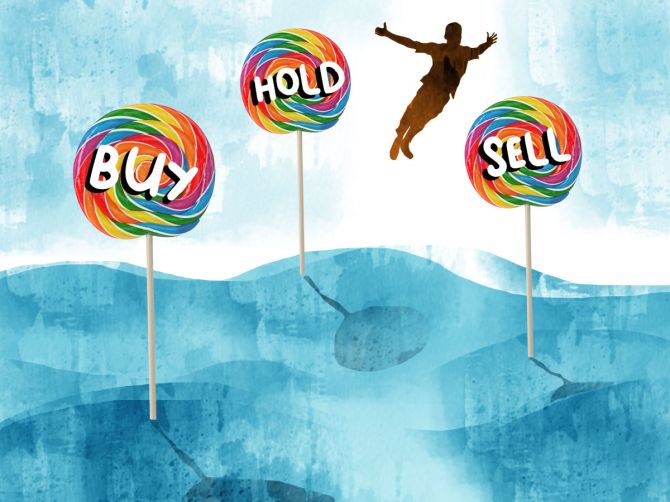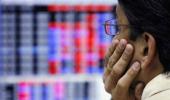If the central banks act harshly now, the markets will crash and then rally.
If they are hesitant, the pain will be prolonged, predicts Debashis Basu.

Those who are now in their late sixties or older would know that one of the chief features of the 1970s has come back.
No, I am talking not of the return of disco dancing or bell-bottom trousers but inflation.
As high single-digit inflation persists in the West and double-digit inflation rages elsewhere, it suddenly seems as though nations have lost control over accelerating price rise, which is the ultimate nightmare of economists, politicians, and investors everywhere.
Central banks are rushing to tighten money supply (reducing liquidity and raising interest rates) to control inflation and governments are simultaneously trying to tweak imports, exports, and taxes.
They are facing two problems in doing so. One, after many years the world is simultaneously under a demand and supply shock, with no immediate solution in sight to either.
And two, and for the first time, inflationary expectations seem to be setting in, which is what policymakers dread the most.
Inflation is as much a matter of perception as it is of facts.
If businessmen and householders believe that prices will rise (something economists call inflationary expectations), their actions will further push up prices.
In mid-March, I had said in my column, 'Stock markets unconcerned about inflation'.
The market indices went up after that, dropped sharply, and have risen to the same levels they were in mid-March.
Key indices are vacillating, unable to find an answer to one crucial question: Can the central banks control inflation quickly by increasing interest rates and tightening liquidity? If yes, the markets will go up.
If not, they will remain weak. One reason why we won't get a clear answer to this question very soon is that monetary tightening is the only tool that can be deployed easily in the short term, but it is a blunt tool to control inflation.
After all, to bring down prices, one has to increase supply, which seems impossible in the short term.
So policymakers have to dampen demand. It is possible to cool demand, or so central banks believe, with a tighter money supply.
Unfortunately, monetary tightening cannot cut demand for products that are non-discretionary, such as fuel, fertilisers, edible oils, and foods, which are the main cause of inflation now.
Tightening can affect only speculative investment, the discretionary spending of the middle class, and some asset purchases.
This is why among the first casualties of inflation have been highly speculative 'investments' such as crypto-currencies and loss-making tech companies in need of a perpetual supply of cheap funds in order to survive.
If monetary tightening affects discretionary spending (of the middle class and the poor) and non-essential assets mainly, how will demand for the essential items shrink?
In the US they recorded the highest increases last year: Natural gas (176 per cent), heating oil (100 per cent), gasoline (91 per cent), crude oil (70 per cent), cotton (66 per cent), nickel (55 per cent), wheat (54 per cent), and coffee (48 per cent).
The prices of these commodities will cool when their supply increases, which is not in the hands of the central banks.
However, if inflation does not drop, central banks will keep tightening liquidity as long as that is the main tool available.
This will destroy demand across the board, just like antibiotics, which kill both good and bad bacteria.
The danger is that these decisions have to be made on the fly, and, with hindsight knowledge, tightening can also go too far, especially if the economy is otherwise strong, as it is now.
Indeed, in the US, the labour market is tight and dislocation in supply/demand in dozens of products -- from energy to food to industrial raw materials -- is so severe that it may require extraordinary tightening to bring down inflation, which will also shrink the economy.
Such action could take even the US to the edge of a recession.
As top US investor Bill Ackman says: 'There is no economic precedent for 200 to 300 bps of Fed funds addressing 8 per cent inflation with unemployment at 3.6 per cent.
'Current Fed policy and guidance are setting us up for double-digit sustained inflation ... It ends when the Fed puts a line in the sand on inflation and says it will do 'whatever it takes'.'
'And then demonstrates it is serious by immediately raising rates to neutral and committing to continue to raise rates until the inflation genie is back in the bottle.'
All this is terrible news for stocks.
As Ackman says, 'If the Fed doesn't do its job, the market will do the Fed's job, and that is what is happening now.'
If the US sneezes, emerging markets like India will catch a cold.
The good news...
The good news is that the markets do not react to past data; they are forward-looking.
They will not wait for economic news to improve or for inflation to drop to 2 per cent again.
They will watch the intent of central banks, and, if they are not satisfied, they will keep marking down the prices of stocks selectively (those with high valuations and low growth will fall sharply).
Then, at some point, with the first downward tick of inflation, or when the valuation of quality stocks becomes attractive again, the markets will rally.
After all, the valuations of leading Indian stocks are already back to the long-term average and companies are enjoying strong underlying demand.
There is no sign of an earnings recession as in the previous periods of high inflation.
Also, the excesses of cheap money in India have been confined to the unlisted sector (which indirectly will affect consumption a bit) and a few outrageously priced public issues.
In short, the probability that inflation will come down on its own is low.
This means if the central banks act harshly now, the markets will crash and then rally.
If they are hesitant, the pain will be prolonged.
Debashis Basu is the editor of moneylife.in
Feature Presentation: Aslam Hunani/Rediff.com












 © 2025
© 2025